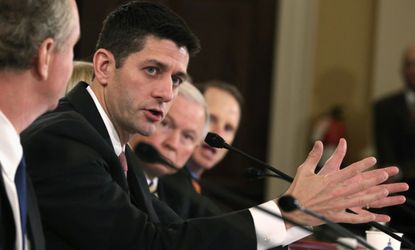Paul Ryan's big, tricky budget moment is here
It's not nearly as simple as "deal or no deal?"


Congress has been historically inactive this year. But with the clock winding down on 2013, there is still a glimmer of hope that bicameral negotiations could produce a modest budget deal that would replace some of the sequester cuts.
For Rep. Paul Ryan (R-Wis.), the House GOP budget guru and potential presidential aspirant, that presents both an opportunity and a challenge. A bipartisan deal could serve as a rare (for him) legislative achievement that pads his credentials and charts the GOP's course heading into the next election cycle. Yet at the same time, Ryan would risk spurning the GOP base — and its vocal Ted Cruz types — if he's perceived as bending too far to Democratic demands.
Ryan and his Senate counterpart Sen. Patty Murray (D-Wash.) are believed to be close to a very small deal that would eliminate some of the automatic budget cuts scheduled to go into effect over the next two years. Though nothing is finalized, the deal would reportedly nix about one-third of the sequester-mandated cuts, splitting the reinstated funds between defense and non-defense spending.
Subscribe to The Week
Escape your echo chamber. Get the facts behind the news, plus analysis from multiple perspectives.

Sign up for The Week's Free Newsletters
From our morning news briefing to a weekly Good News Newsletter, get the best of The Week delivered directly to your inbox.
From our morning news briefing to a weekly Good News Newsletter, get the best of The Week delivered directly to your inbox.
Since Republicans won't go for tax increases, and Democrats won't tackle entitlement reform without also touching revenue, Murray and Ryan have been reduced to "pulling together odds and ends to make a deal, including non-tax revenue like auctioning broadband spectrum and airport security fees, as well as increasing employee contributions to federal workers' retirement programs," wrote MSNBC's Suzy Khimm.
In short: The negotiators are looking at a tiny deal, far less than the sweeping budget overhaul Ryan has famously proposed before in his spending blueprints.
Still, a deal would be a success for a Congress so dysfunctional it triggered a two-week government shutdown and flirted with debt default. Republicans would love to roll back some of the cuts to defense spending. And Democrats are eager for a deal that would wipe out some of the cuts to cherished domestic programs like Head Start.
Such a deal, if passed, would also be a significant accomplishment for Ryan to add to his otherwise unimpressive legislative record.
Sign up for Today's Best Articles in your inbox
A free daily email with the biggest news stories of the day – and the best features from TheWeek.com
Though a noted policy wonk, none of Ryan's radical budget bills have gone anywhere in Congress. In fact, only two Ryan-drafted bills, neither of which were anything truly groundbreaking, have become law in the congressman's entire House career. One bill named a post office; the other amended a tax on arrows.
A deal would thus "burnish an image of someone willing to find — and tout — common ground in a historically divided Washington," wrote Politico's Jake Sherman and John Bresnahan. "It's a credential that could serve him well as he looks to grab the chairmanship of the Ways and Means Committee or run for his party's nomination before the 2016 presidential contest."
Still, an agreement almost assuredly wouldn't do anything about long-term GOP priorities Ryan has championed before, like cutting entitlement spending.
And there's the rub for Ryan: A small deal could turn off both conservative lawmakers and voters.
Conservative House members dug in on their impossible demands during the shutdown even as it obliterated the party's approval rating. Those same members could balk at a proposed deal that doesn't cut deeper. And though a deal could still pass with the help of Democratic votes, Speaker John Boehner (R-Ohio) would risk further splitting his fragile caucus by cobbling together a Democratic-heavy coalition.
A mini-deal could also be problematic for Ryan's perceived presidential ambitions if it causes the party's right flank, which plays a disproportionately large role in the primary nominating process, to sour on him.
"If the Tea Party turns up the rhetorical heat, would Ryan risk a presidential bid to rescue the country from another government shutdown?" wrote Salon's Joan Walsh. "I've never seen him stand up to that kind of ideological pressure from the right, but there could be a first time."
If he's keen on keeping his conservative hero status and pursuing a 2016 run, Ryan really ought to tread carefully.
Create an account with the same email registered to your subscription to unlock access.
Jon Terbush is an associate editor at TheWeek.com covering politics, sports, and other things he finds interesting. He has previously written for Talking Points Memo, Raw Story, and Business Insider.
-
 'A direct, protracted war with Israel is not something Iran is equipped to fight'
'A direct, protracted war with Israel is not something Iran is equipped to fight'Instant Opinion Opinion, comment and editorials of the day
By Harold Maass, The Week US Published
-
 Today's political cartoons - April 17, 2024
Today's political cartoons - April 17, 2024Cartoons Wednesday's cartoons - political anxiety, jury sorting hat, and more
By The Week US Published
-
 Arid Gulf states hit with year's worth of rain
Arid Gulf states hit with year's worth of rainSpeed Read The historic flooding in Dubai is tied to climate change
By Peter Weber, The Week US Published
-
 Arizona court reinstates 1864 abortion ban
Arizona court reinstates 1864 abortion banSpeed Read The law makes all abortions illegal in the state except to save the mother's life
By Rafi Schwartz, The Week US Published
-
 Trump, billions richer, is selling Bibles
Trump, billions richer, is selling BiblesSpeed Read The former president is hawking a $60 "God Bless the USA Bible"
By Peter Weber, The Week US Published
-
 The debate about Biden's age and mental fitness
The debate about Biden's age and mental fitnessIn Depth Some critics argue Biden is too old to run again. Does the argument have merit?
By Grayson Quay Published
-
 How would a second Trump presidency affect Britain?
How would a second Trump presidency affect Britain?Today's Big Question Re-election of Republican frontrunner could threaten UK security, warns former head of secret service
By Harriet Marsden, The Week UK Published
-
 'Rwanda plan is less a deterrent and more a bluff'
'Rwanda plan is less a deterrent and more a bluff'Instant Opinion Opinion, comment and editorials of the day
By The Week UK Published
-
 Henry Kissinger dies aged 100: a complicated legacy?
Henry Kissinger dies aged 100: a complicated legacy?Talking Point Top US diplomat and Nobel Peace Prize winner remembered as both foreign policy genius and war criminal
By Harriet Marsden, The Week UK Last updated
-
 Trump’s rhetoric: a shift to 'straight-up Nazi talk'
Trump’s rhetoric: a shift to 'straight-up Nazi talk'Why everyone's talking about Would-be president's sinister language is backed by an incendiary policy agenda, say commentators
By The Week UK Published
-
 More covfefe: is the world ready for a second Donald Trump presidency?
More covfefe: is the world ready for a second Donald Trump presidency?Today's Big Question Republican's re-election would be a 'nightmare' scenario for Europe, Ukraine and the West
By Sorcha Bradley, The Week UK Published